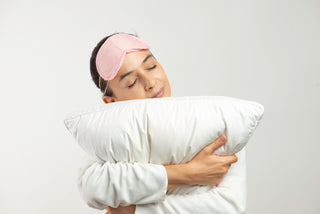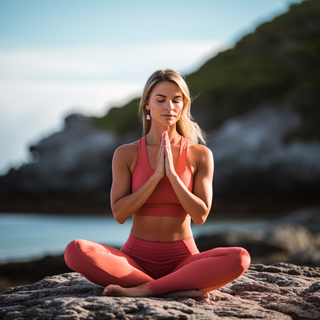Welcome back, Wellness Warriors! Are you ready to revolutionize your sleep routine? Sleep hygiene is no passing fad; it’s a science-backed method for enhancing your life. Let’s delve deeper into the expert recommendations of Dr. Phyllis Zee, an eminent sleep medicine expert. Dr. Zee’s guidelines can change the way you sleep, and in turn, improve your overall health and wellness as being one of the country’s foremost experts on sleep.
Dr. Zee is not only the associate director of the Center for Sleep & Circadian Biology at Northwestern University, but also the director of the Sleep Disorders Center and the Sleep Medicine Fellowship program at Northwestern University Feinberg School of Medicine. Let’s take a closer look at what leading sleep expert, Dr. Phyllis Zee recommends!

Dr. Phyllis Zee's Key Sleep Recommendations
- The Importance of Natural Light - Expose Yourself to Morning Light: Dr. Zee emphasizes the necessity of absorbing natural light within the first hour of waking up to stimulate the body's circadian rhythm. Learn more sleep wellness benefits from SportPort Active’s blog, Unveiling the Hidden Benefits of Morning Sunlight.
- Managing Screen Time - Limit Blue Light Exposure: As per Dr. Zee, the blue light from screens inhibits melatonin production, making it harder to fall asleep. She advises limiting screen time an hour before bedtime.
- Use Screen Filters: If screen time is unavoidable, use blue light filters or apps that adjust your device's lighting according to the time of day.
Mindfulness Techniques
- Practice Mindfulness Before Sleep - Dr. Zee suggests incorporating mindfulness techniques like deep breathing and progressive muscle relaxation to ease into sleep. These practices not only calm the mind but also prepare the body for a restful and rejuvenating night's slumber. Follow our blogs with holistic healing expert, Cali Rossen, Founder of SacredFequencies.org "Inspiring Inner and Outer Healing".
- Diet and Sleep - Be Cautious with Caffeine and Alcohol: Both these substances can wreak havoc on sleep quality. Dr. Zee recommends avoiding them close to bedtime. The Sleep Foundation is also a great resource for learning more about diet and sleep.
- The Sleep Environment - Temperature Control: She advises keeping the bedroom temperature between 60-65°F for optimal sleep conditions.

The Rest of the Sleep Hygiene Equation
Consistency is key, whether it’s a weekend or a weekday, aim to go to bed and wake up at the same time. This consistency tunes your body's internal clock for better sleep quality.
- Exercise: A Double-Edged Sword – Regular exercise can significantly improve sleep quality. It’s crucial not to work out too close to bedtime, allowing a minimum of two hours prior to bedtime will allow adrenalin and endorphins to baseline. Interested in improving your health? Check out our blog, Embracing Mindful Movement; Powerful Path to Health and Wellness.
- Food for Sleep - Heavy or spicy meals right before hitting the sack can be disruptive. Opt for something light and easily digestible. Renowned holistic chef’s share helpful ways of nourishing your body for better health and wellness.
- The Verdict - According to the American Academy of Sleep Medicine, sleep hygiene alone might not cure chronic insomnia. Other therapies such as cognitive behavioral therapy for insomnia (CBTi) and relaxation techniques should be considered for chronic sleep issues. Stress management is important for quality sleep hygiene. Tapping for stress management is another useful tool for controlling anxiety.
Your Path to Holistic Wellness: Talking Zzzzz's with Our Sleep Expert
Impeccable sleep hygiene, as advocated by experts like Dr. Phyllis Zee, can be a game-changer in your pursuit of health and wellness. SportPort Active is in full support of pursuing the best holistic approach for your sleep hygiene. By adopting the right sleep practices, you’re not just enhancing your nightly rest. You're also setting the stage for optimal physical health, mental well-being, and emotional balance.
At SportPort Active, we are committed to providing our readers with fact-based knowledge, as noted with Dr. Zee, Northwestern University. We hope you’ll take a minute and read through this insightful Q&A, as cited by expert Dr. Phyllis Zee.

Facts on Sleep Hygiene and Do’s and Don’ts
Do you get enough sleep? How much do you really need? Find out from Phyllis Zee, MD, director of the Sleep Disorders Center as she delves into research over the past decade, her findings are staggering - to say the least.
What are we learning about sleep?
That sleep is a marker of health. Studies show if you sleep less than six hours, you’re at risk for diabetes, cardiovascular disease, obesity, hypertension. If you look at the epidemic of obesity, it parallels the epidemic of sleep loss. Poor health can lead to poor sleep, and poor sleep can lead to poor health. Now we have some of the science to back up the idea that sleep is important. We’re beginning to understand the mystery of why the brain and the body must shut down for a third of the day.
So are we getting enough sleep?
About 30 percent of Americans get less than six hours a night. You can never recover the sleep you lose, but you can get back on track. If you’re awake for more than 16 hours, your performance begins to plummet, and it goes down fast. After about 20 hours, your ability to perform a neurocognitive function is about as good as if you were legally drunk. A drowsy driver is just as bad as an impaired driver.
Why do you think it took so long for sleep research to become popular?
Over the past 10 years, there has been tremendous progress in our appreciation of the relationship between sleep and mental, neurological, and overall physical health. Recent research from our group, and others, has shown that poor sleep is a risk for psychiatric, cardiovascular, and metabolic disorders. Basically, poor sleep can lead to poor health and vice versa. Another major reason is that we now have the tools to diagnose and treat common sleep disorders such as insomnia, circadian rhythm disorders, sleep apnea and restless legs syndrome.
A recent survey showed that about 95% of us are using computers, iPads, cell phones or watching TV just before bed. How does that affect our sleep?
It can make sleep more difficult. If you're using iPads or laptops close to bedtime, the light they emit can be sufficiently stimulating to the brain to make it more awake and delay your ability to sleep. More importantly, the light from these devices could also be sufficient to affect your circadian rhythm - the clock in your brain that determines when you sleep and when you wake up.
What is our sleep research telling us here at Northwestern?
Northwestern is a hotbed of study in sleep research for humans and animals. The biggest development is the discovery of circadian genes. All your organs contain ‘clock genes.’ Because of this revolution in the understanding of the biology, we can now translate it into the clinical for health and disease.
What have you been researching lately?
We just published an article in the online journal, Obesity, about the effects of going to bed late and sleeping late on weight gain. We discovered that if you sleep late and eat late, it increases your risk of weight gain. The timing of your sleep affects your choice of foods, especially unhealthy foods. It’s about eating at the wrong circadian time. Clearly the message is that circadian timing and getting less sleep results in people being more likely to eat high fat foods and fast foods and eat at a time of day when the body is not ready to process those kinds of foods. For more nourishing recipes to energize your morning routine check out our blog!
Where do patients sleep during a sleep study here?
Northwestern conducts about 2,600 sleep studies a year to diagnose sleep problems. We have a beautiful, newly constructed sleep disorder center in the Arkes Family Pavilion with 12 beds. It’s an amazing place, a state-of-the-art center where the comfort level is very high, like a fine hotel. It was designed with the patient in mind, as one-stop shop where a patient with any kind of sleep disorder can be evaluated by a physician and undergo a sleep study, if necessary.
How much sleep do you get?
I’m one of these people who has flexible sleep. I try 7-8 hours. I prefer 8. On average I get 61/2 to 7. I say less than six hours is a bad zone, because that’s what the data show. I tell my patients at least 61/2. I try and I do catch up on weekends when I can.

Do you get ribbed because of your last name (Zee… ZZZZZ)?
No jokes—just that I should use it for marketing a book: “Better Zs with Dr. Zee.” I married into my name, so smart choice after all!
As we conclude this segment, we hope you enjoyed Dr. Zee’s insightful knowledge on ‘Sleep Hygiene.’ Remember that your health and wellness come first!
“Unearth the wisdom of sleep hygiene and reshape your health, one restful night at a time. Your journey to holistic wellness starts now.”
Here’s additional information and helpful tips:


